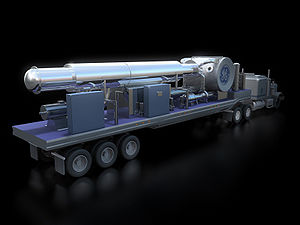Course:ECON371/UBCO2010WT1/GROUP2/Article2
Back to
Group 2: The Environmental Impacts of Natural Gas Extraction
Article 2: GE to Help Natural Gas Producers Treat Shale Gas Frac Water at the Well Site
Summary
According to the MarketWatch website, the GE company (General Electricity Co.), which is a diversified infrastructure, finance and

media company, has recently introduced a mobile evaporator. The main purpose of this new technology is to reuse the water from the hydraulic fracturing process. This article explains the benefits of the invention, not only to the natural gas producers in decreased costs for water transport and treatment but also to the people who live close by the site in the form of reduced noise from fewer water-carrying trucks.
The mobile evaporator contains a pretreatment module, an evaporator module, and a compressor module. First, the machine will boil the used water, and then collect the steam and condense it into distilled water. The water can now be reused in the hydraulic fracturing process again, reducing the use of freshwater. Furthermore, dissolved solids and chemicals used in the fracturing process can be prevented from entering the water supply. The evaporator can recycle 50 gallons of water per minute.
Analysis
Social Costs: There are few costs related to the use of GE's new evaporator. Initially, the gas producer will have to make a large investment to

purchase this new abatement technology. This will allow the producer to greatly reduce emissions at a constant or decreasing marginal abatement cost, as illustrated by the marginal abatement curve. At a certain level of emission reduction, the marginal abatement cost will continue to rise again. Therefore it is expected that even with the new evaporator, natural gas producers will continue emitting pollutants, though at much lower levels. Since the effect on ambient quality depends on the environment's ability to absorb the pollution, we expect that the effects of pollution, and thus the environmental damage, will differ among locations, even if emission levels are the same. Another cost to the society is the opportunity cost of the materials used to build the evaporators.
Social benefits:
The benefits for this new innovation in natural gas extraction are numerous. Underground, there are large amounts of shale reservoirs, which hold the potential for oil and natural gas production. However, these reservoirs cannot naturally flow above ground, so hydraulic fracturing is required. The problem occurs with the amount of water wasted in the process of fracking and this is where GE’s new innovation comes in by making this water reusable in production as well as using less freshwater and lowering possible environmental damages. Its ability to recycle water in addition to being energy efficient makes GE’s innovation a social benefit.
However, there are private benefits for the companies involved in natural gas extraction that decide to embrace such technology. Firstly, it is completely mobile decreasing the costs of moving and disposing of wastes. Secondly, the natural gas industry is increasingly getting stricter government regulations. These regulations when put into effect would decrease production output and subsequently result in employees losing their jobs. Therefore, these companies are presented with incentives to innovate, like the case with GE. The research and development of these innovations results in the creation of new jobs, offsetting the loss from lower output. Once these innovations have become commercially viable (GE’s mobile evaporator is expected to be on the market by 2011), not only do these companies have a cost-effective unit, but society will be benefitting and the government will have achieved its goal of reducing environmental externalities.
Government Policy:
Government policy has impacted the natural gas industry through tougher emission restrictions in some areas. These restrictions caused an increase in total abatement costs to the producers, which were passed down to consumers in the form of price increases. The higher prices resulted in a lowering of quantity demanded by consumers, which led the firm to reduce their output. As a result, some people in the natural gas industry may have lost jobs. However, as a result of the tougher regulations, there is a push on firms like GE to innovate. The increased demand for abatement technology created more jobs in that industry. As a result, the economy has adjusted to tougher restrictions over time.
Prof's Comments
Nice article. You are right about the rotation inward of the MAC curve, as show in the figure. I agree with the regulation creating a push for the new technology. Finding a cheaper way to meet the standard spurred innovation. How does this compare to a technology standard? Also, be wary of the emphasis on jobs. Jobs are typically not an economic cost, as workers who loose their jobs in one place, will find work elsewhere. The costs are relocation costs, the cost related to moving, etc. involved with taking a new job somewhere else.